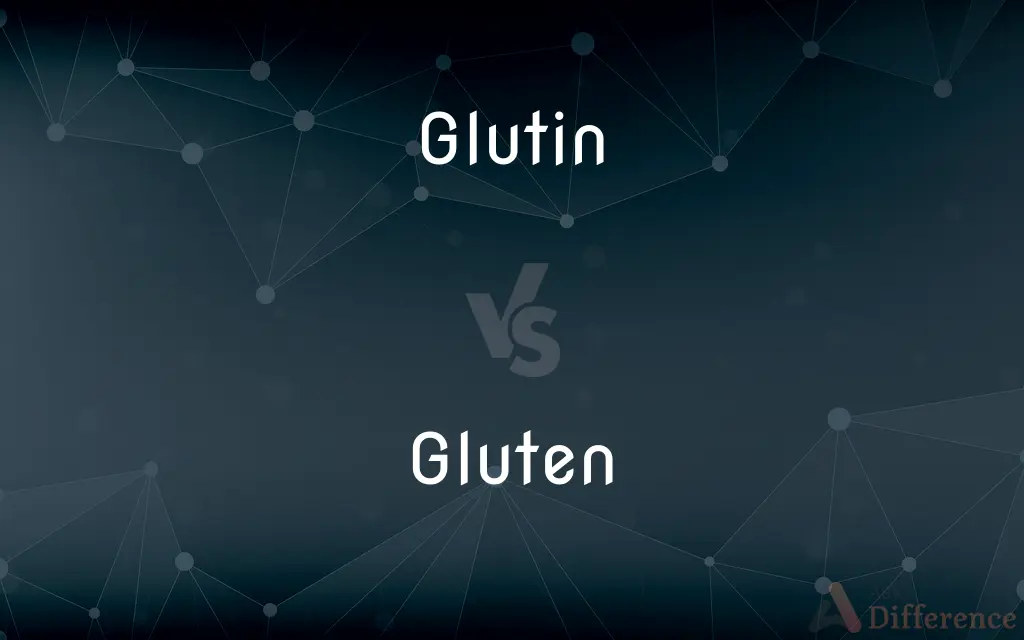Glutin vs. Gluten — What's the Difference?
By Maham Liaqat & Urooj Arif — Updated on March 6, 2024
Gluten is a protein found in wheat, barley, and rye, crucial for dough's elasticity, while glutin refers to a sticky, glue-like substance, often confused with gluten but is not a specific protein.

Difference Between Glutin and Gluten
Table of Contents
ADVERTISEMENT
Key Differences
Gluten is primarily known for its presence in wheat-based products, providing elasticity and shape to bread and dough. It plays a vital role in the texture and chewiness of baked goods. On the other hand, the term "glutin" is less commonly used and often misunderstood. It may refer to glue-like substances or mistakenly used for gluten but does not correspond to a specific protein in the culinary or nutritional context.
Gluten consumption is a concern for people with celiac disease or gluten sensitivity, as it triggers an immune response that damages the intestine. Whereas, "glutin" does not have a defined role or recognized impact in dietary contexts, making its relevance primarily in confusion with gluten or discussions about adhesive substances.
In the food industry, gluten's role is well-defined, contributing to the structure and texture of products. Glutin, however, lacks a clear definition or application in this sector, highlighting the specificity and importance of gluten in food science and nutrition.
Regarding consumer awareness, gluten is a widely recognized term, often seen in product labeling ("gluten-free") due to dietary restrictions. In contrast, glutin might appear in discussions or literature but lacks the direct relevance and recognition that gluten holds in public health and diet.
The distinction between gluten and glutin highlights the importance of accurate terminology in dietary discussions. While gluten has a significant impact on health and food production, glutin's role and definition remain ambiguous, emphasizing the specificity of gluten's role in modern diets.
ADVERTISEMENT
Comparison Chart
Definition
A mixture of proteins found in wheat and related grains.
A non-specific term sometimes used to refer to glue-like substances.
Main Use
Essential for the texture and elasticity of baked goods.
Not clearly defined, often confused with gluten.
Health Concerns
Can cause adverse reactions in individuals with celiac disease or gluten sensitivity.
No known dietary relevance or health concerns.
Dietary Recognition
Widely recognized and labeled for dietary restrictions.
Rarely mentioned or recognized in dietary contexts.
Industry Relevance
Key component in food industry for product texture.
Lacks a clear role or application in the food industry.
Compare with Definitions
Glutin
Sometimes used to describe sticky or adhesive substances.
The label mentioned glutin without specifying its role.
Gluten
The substance in wheat products that can trigger celiac disease.
She avoids gluten due to her celiac diagnosis.
Glutin
Lacks a specific dietary or health context.
Glutin's relevance in nutrition is not well-defined.
Gluten
Subject of increasing health and wellness discussions.
Gluten has been a hot topic in nutrition circles recently.
Glutin
Rarely used in modern culinary terminology.
Modern chefs seldom mention glutin in their recipes.
Gluten
A consideration for those with dietary restrictions.
Gluten-free products are essential for his diet.
Glutin
Often confused with gluten in discussions.
She mistakenly referred to gluten as glutin in the recipe.
Gluten
A protein that gives bread its airy and fluffy texture.
Gluten's elasticity is vital for bread to rise properly.
Glutin
Can lead to confusion due to its similarity to gluten.
The discussion about glutin versus gluten clarified their differences.
Gluten
Found in wheat, barley, and rye, contributing to dough's chewiness.
Gluten adds a chewy texture to bagels and breads.
Glutin
Synonym of gliadin
Gluten
Gluten is a group of seed storage proteins found in certain cereal grains. Although, strictly speaking, "gluten" pertains only to wheat proteins, in the medical literature it refers to the combination of prolamin and glutelin proteins naturally occurring in all grains that have been demonstrated capable of triggering celiac disease.
Glutin
Same as Gliadin.
Gluten
The mixture of proteins, including gliadins and glutelins, found in wheat grains, which are not soluble in water and which give wheat dough its elastic texture.
Glutin
Sometimes synonymous with Gelatin.
Gluten
Any of the prolamins found in cereal grains, especially the prolamins in wheat, rye, barley, and possibly oats, that cause digestive disorders such as celiac disease.
Gluten
(obsolete) Fibrin (formerly considered as one of the "animal humours").
Gluten
(rare) Any gluey, sticky substance.
Gluten
The major protein in cereal grains, especially wheat; responsible for the elasticity in dough and the structure in baked bread.
Gluten
(geology) A gluey, sticky mass of clay, bitumen etc.
Gluten
The viscid, tenacious substance which gives adhesiveness to dough.
Gluten
A protein substance that remains when starch is removed from cereal grains; gives cohesiveness to dough
Common Curiosities
What does glutin refer to?
Glutin is occasionally used to describe sticky or glue-like substances but is often confused with gluten and does not have a specific dietary meaning.
Who needs to avoid gluten?
Individuals with celiac disease or gluten sensitivity need to avoid gluten to prevent health complications.
What is gluten?
Gluten is a protein found in wheat, barley, and rye, important for the elasticity and texture of bread and other baked goods.
Can glutin be found in food products?
The term glutin is not commonly used in the context of food products and lacks a clear definition related to nutrition.
Is there a gluten in rice?
Rice does not contain gluten, making it a safe choice for individuals with gluten sensitivities.
Is glutin harmful to people with gluten sensitivities?
Since glutin is not a well-defined dietary substance, it does not apply to the discussion on gluten sensitivities.
Are there any health benefits to eating gluten?
For people without gluten-related disorders, gluten contributes to the nutritional and textural quality of foods but does not offer specific health benefits.
Is gluten present in all types of bread?
Most bread contains gluten, but there are gluten-free options made with alternative grains.
What is the difference between gluten and wheat?
Gluten is a protein found in wheat and other grains, while wheat is a type of grain that contains gluten.
What are common sources of gluten?
Gluten is commonly found in wheat, barley, rye, and products made from these grains.
What does gluten-free mean?
Gluten-free means the product does not contain gluten and is safe for individuals with celiac disease or gluten sensitivity.
Can gluten be replaced in recipes?
Yes, gluten can be replaced with alternative flours and binders in recipes for gluten-free diets.
How can I identify gluten in food labels?
Gluten is often labeled on food products, especially if they are certified as gluten-free.
How does gluten affect the body?
In sensitive individuals, gluten can trigger an immune response that damages the intestine, while it has no adverse effects on those without gluten sensitivities.
Why is gluten important in baking?
Gluten provides elasticity and structure to dough, helping bread and other baked goods to rise and maintain their shape.
Share Your Discovery

Previous Comparison
Raja vs. Rajput
Next Comparison
Right vs. RightenAuthor Spotlight
Written by
Maham LiaqatCo-written by
Urooj ArifUrooj is a skilled content writer at Ask Difference, known for her exceptional ability to simplify complex topics into engaging and informative content. With a passion for research and a flair for clear, concise writing, she consistently delivers articles that resonate with our diverse audience.














































